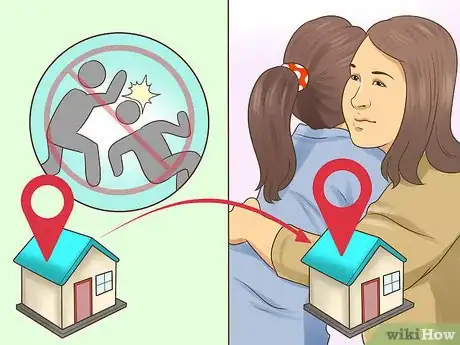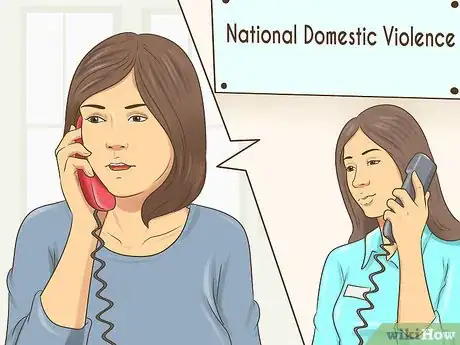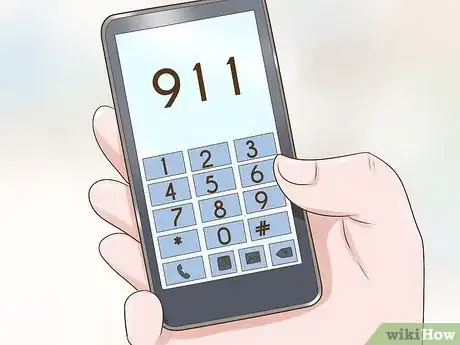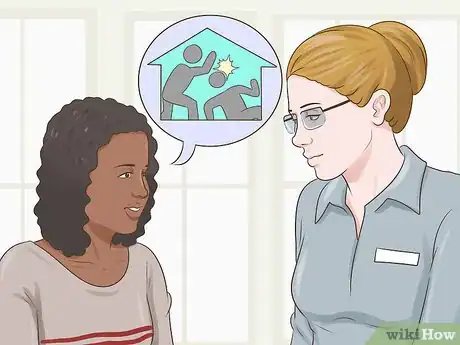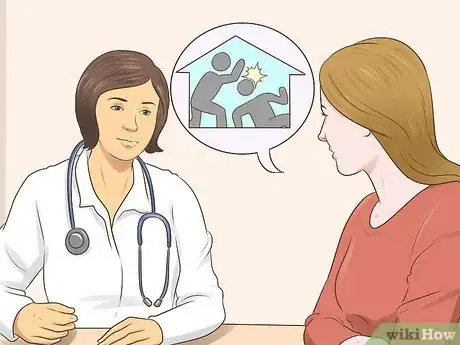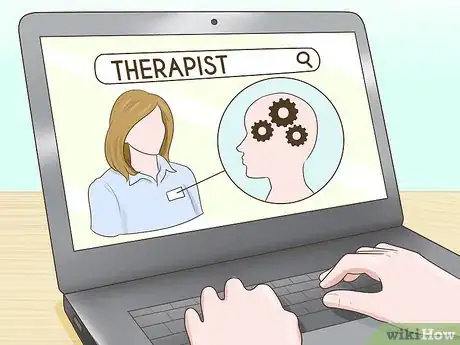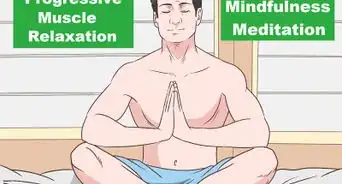This article was co-authored by Jay Reid, LPCC. Jay Reid is a Licensed Professional Clinical Counselor (LPCC) in private practice in San Francisco, CA. He specializes in helping clients who have survived a narcissistic parent or partner. Treatment focuses upon helping clients identify and challenge self-diminishing beliefs as a result of narcissistic abuse. Jay holds a BA in Psychology from the University of Pennsylvania and an MS in Clinical Psychology from Penn State University.
This article has been viewed 45,914 times.
Physical abuse can come in many forms, and can affect children as well as adults. Actions like punching, kicking, slapping, pinching, whipping, beating, or any other form of injury is considered physical abuse. In many countries, it is against the law to physically abuse someone else.[1] If you are dealing with physical abuse at home, at school, or at work, you should seek immediate help right away. You can also reach out to others if you are nervous about speaking to the police or other support services. To deal with the trauma of physical abuse, do not be afraid to seek professional therapy and counseling.
Steps
Getting Immediate Help
-
1Get away from the abuser. If you are in immediate danger, start by getting away from the abuser. This may mean getting out of your home and going to a safe place with your cellphone, such as a nearby cafe or a friend’s house. You may need to get out of your workplace or your school if your abuser if there. Find a safe place to go so you can call for help.[2]
- If you cannot get away from your abuser, try to find a time when the abuser is out or away to then call for help. For example, if your husband is physically abusing you, pick a time when he is at work to call for help.
- If you go to a cafe or store instead of a friend or family member's house, contact them right away and let them know where you are as you make arrangements.
-
2Call a helpline. There are many helplines set up to help those dealing with physical abuse and domestic violence.[3] These helplines are staffed with experienced individuals who will keep your call confidential. They can point you in the direction of a shelter you can go to to get away from the abuser and other services you can access for help. Most helplines are open 24/7, every day of the year.[4]
- In the U.S. and Canada, call the National Domestic Violence Hotline at 1-800-799-7233. You can also call 1-800-4-A-CHILD for help.
- In the UK, call the Women’s Aid UK at 0808 2000 247.
- In Australia, call 1800RESPECT (1800 737 732).
- You can find a full list of global helplines and crisis centers on the International Directory for Domestic Violence Agencies website.
Advertisement -
3Dial 911. You can also get immediate help by dialing 911 to get in touch with the police. When the dispatcher responds to your call, describe your situation and provide your location. Explain that you are experiencing physical abuse and need help.[5]
- Depending on your situation, the dispatcher may tell you to stay where you are or to go into a safe place in your home. They may also suggest you go to a shelter or another place nearby that is safe until help arrives.
- If you can, use this time to recall everything that happened during this incident of abuse. Tell the dispatcher and/or write it down if possible. This may make it easier to report the incident to the police.
Reaching Out to Others
-
1Ask family or friends for help. You might find it difficult to contact a helpline or to call the police, especially if you are afraid of your abuser. If contacting the police seems like too big a step, start by asking family and friends for help. Reach out to a family member you trust or a friend that you are comfortable talking to. Explain to them that you are dealing with physical abuse and need help.[6]
- Don't assume that the person will be too busy or uninterested in helping you, or that you will be burdening them somehow. Your abuser's words or actions may have left you feeling worthless and unloved, but you and your safety are important, and your friends and family will be there for you.
- For example, you might say to a friend, “I am not sure how to deal with physical abuse at home. I need help.” Or you might say to a family member, “I am experiencing physical abuse at home. I want to get out of the situation. Can you help me?”
-
2Talk to a mentor or a teacher. You may be more comfortable with speaking to a mentor in your community or to a teacher at school about the physical abuse. Reach out to a mentor or teacher and tell them that you need help with the physical abuse you are experiencing. Ask to talk to them privately so you can tell them in confidence.[7]
- For example, you may say to a mentor, “I’m experiencing physical abuse at home. I need help.”
-
3Reach out to your doctor. Speak to your primary care doctor about the physical abuse, especially if they are starting to notice your injuries during your appointments with them. Tell them that you need help and want to get away from your abuser. They should be able to provide resources to help you do this.
- For example, you may say to your doctor, “I am struggling with physical abuse at school. Can you help me address this issue?”
-
4Make a plan. Regardless of whether you ask family, friends, a mentor, or doctor for help, you and this person should work together to create a detailed and specific escape plan. This involves identifying a safe place for you to stay, a good time to leave, gathering important documents and papers, putting aside some money, and so on. You can find more useful tips for making an escape plan at the National Domestic Violence Hotline website (http://www.thehotline.org/help/path-to-safety/#leaving), or by contacting a hotline, doctor, therapist, or shelter.
Seeking Professional Therapy and Counseling
-
1Look for a therapist or counselor in your area. Survivors of physical abuse can find professional therapy and counseling helpful. Talking to a mental health professional can help you deal with feelings of anger, grief, depression, and fear due to the physical abuse. Look for a therapist who has worked with physical abuse victims in the past and who has experience in this area.[8]
- Ask your primary care doctor to refer you to a therapist. You can also search for a therapist online.
- Note that you do not have to wait until you have left the relationship before you seek counseling. Your therapist can support you as you prepare to leave and help you develop a safe action plan.
-
2Set up a consultation. Start by arranging a consultation with the therapist or the counselor. Meet with them and see if you feel comfortable speaking to them about the physical abuse. Discuss treatments you might try to address the physical abuse. Ask the therapist what they can offer you as you recover from this trauma.[9]
- For example, they may suggest that you attend a support group for survivors of abuse. They may also suggest role play therapy and play therapy, especially if you are a child who has experienced abuse.
-
3Attend therapy sessions regularly. Try to have scheduled sessions with the therapist or counselor. Try to have the sessions at the the same time every week. Stick to a regular schedule for the sessions so you are motivated to go to them and can feel you are progressing.[10]
- You may start by going to therapy once a week (or more) or twice a month. Your therapist will suggest a schedule for you to help you deal with your experiences of physical abuse.
- Feel free to take notes during your session and be sure to do any reading or "homework" your therapist suggests.
-
4Address the lasting effects of physical abuse in therapy. Going to therapy can help you deal with the lasting effects of physical abuse, which can include trust issues, anxiety, low self-esteem, relationship issues, substance abuse, and anger issues. Speaking to a therapist or counselor on a regular basis can give you the tools necessary to address these issues and move past them.
- Therapy can also help you identify any patterns of abuse that you may not be aware of, such as from family members or previous partners.
- Your therapist may suggest certain treatments to help you deal specifically with these issues. Over time, you may feel you have taken control of the lingering effects of physical abuse with the help of your therapist.
- Outside of therapy, it can be helpful to establish a routine that gives you a sense of predictability and safety.[11]
Expert Q&A
-
QuestionHow do you cope with abuse?
 Jay Reid, LPCCJay Reid is a Licensed Professional Clinical Counselor (LPCC) in private practice in San Francisco, CA. He specializes in helping clients who have survived a narcissistic parent or partner. Treatment focuses upon helping clients identify and challenge self-diminishing beliefs as a result of narcissistic abuse. Jay holds a BA in Psychology from the University of Pennsylvania and an MS in Clinical Psychology from Penn State University.
Jay Reid, LPCCJay Reid is a Licensed Professional Clinical Counselor (LPCC) in private practice in San Francisco, CA. He specializes in helping clients who have survived a narcissistic parent or partner. Treatment focuses upon helping clients identify and challenge self-diminishing beliefs as a result of narcissistic abuse. Jay holds a BA in Psychology from the University of Pennsylvania and an MS in Clinical Psychology from Penn State University.
Licensed Professional Clinical Counselor If you're experiencing physical abuse, seriously consider seeking out external resources. There are many different domestic violence hotlines that can be consulted discreetly, so you can talk through what you think your abuser may be capable of. Once you've removed yourself from the abusive situation, be kind to yourself as you reestablish a routine of security and normalcy.
If you're experiencing physical abuse, seriously consider seeking out external resources. There are many different domestic violence hotlines that can be consulted discreetly, so you can talk through what you think your abuser may be capable of. Once you've removed yourself from the abusive situation, be kind to yourself as you reestablish a routine of security and normalcy. -
QuestionHow do you move on after an abusive relationship?
 Jay Reid, LPCCJay Reid is a Licensed Professional Clinical Counselor (LPCC) in private practice in San Francisco, CA. He specializes in helping clients who have survived a narcissistic parent or partner. Treatment focuses upon helping clients identify and challenge self-diminishing beliefs as a result of narcissistic abuse. Jay holds a BA in Psychology from the University of Pennsylvania and an MS in Clinical Psychology from Penn State University.
Jay Reid, LPCCJay Reid is a Licensed Professional Clinical Counselor (LPCC) in private practice in San Francisco, CA. He specializes in helping clients who have survived a narcissistic parent or partner. Treatment focuses upon helping clients identify and challenge self-diminishing beliefs as a result of narcissistic abuse. Jay holds a BA in Psychology from the University of Pennsylvania and an MS in Clinical Psychology from Penn State University.
Licensed Professional Clinical Counselor You can connect with friends who are well-adjusted, focus on work, and concentrate on raising your kids, if you have any. Whatever you do, do what aligns with your values and don't be overly ambitious about what you expect from yourself right away.
You can connect with friends who are well-adjusted, focus on work, and concentrate on raising your kids, if you have any. Whatever you do, do what aligns with your values and don't be overly ambitious about what you expect from yourself right away.
References
- ↑ http://www.goodtherapy.org/learn-about-therapy/issues/physical-abuse
- ↑ http://www.goodtherapy.org/learn-about-therapy/issues/physical-abuse
- ↑ Jay Reid, LPCC. Licensed Professional Clinical Counselor. Expert Interview. 7 Aug 2020.
- ↑ https://www.helpguide.org/articles/abuse/domestic-violence-and-abuse.htm
- ↑ https://www.helpguide.org/articles/abuse/domestic-violence-and-abuse.htm
- ↑ http://www.counselling-directory.org.uk/physical-abuse.html#escapingphysicalabuse
- ↑ http://kidshealth.org/en/kids/handle-abuse.html
- ↑ http://www.counselling-directory.org.uk/physical-abuse.html#escapingphysicalabuse
- ↑ http://www.goodtherapy.org/learn-about-therapy/issues/physical-abuse
- ↑ http://www.counselling-directory.org.uk/physical-abuse.html#escapingphysicalabuse
- ↑ Jay Reid, LPCC. Licensed Professional Clinical Counselor. Expert Interview. 7 Aug 2020.
